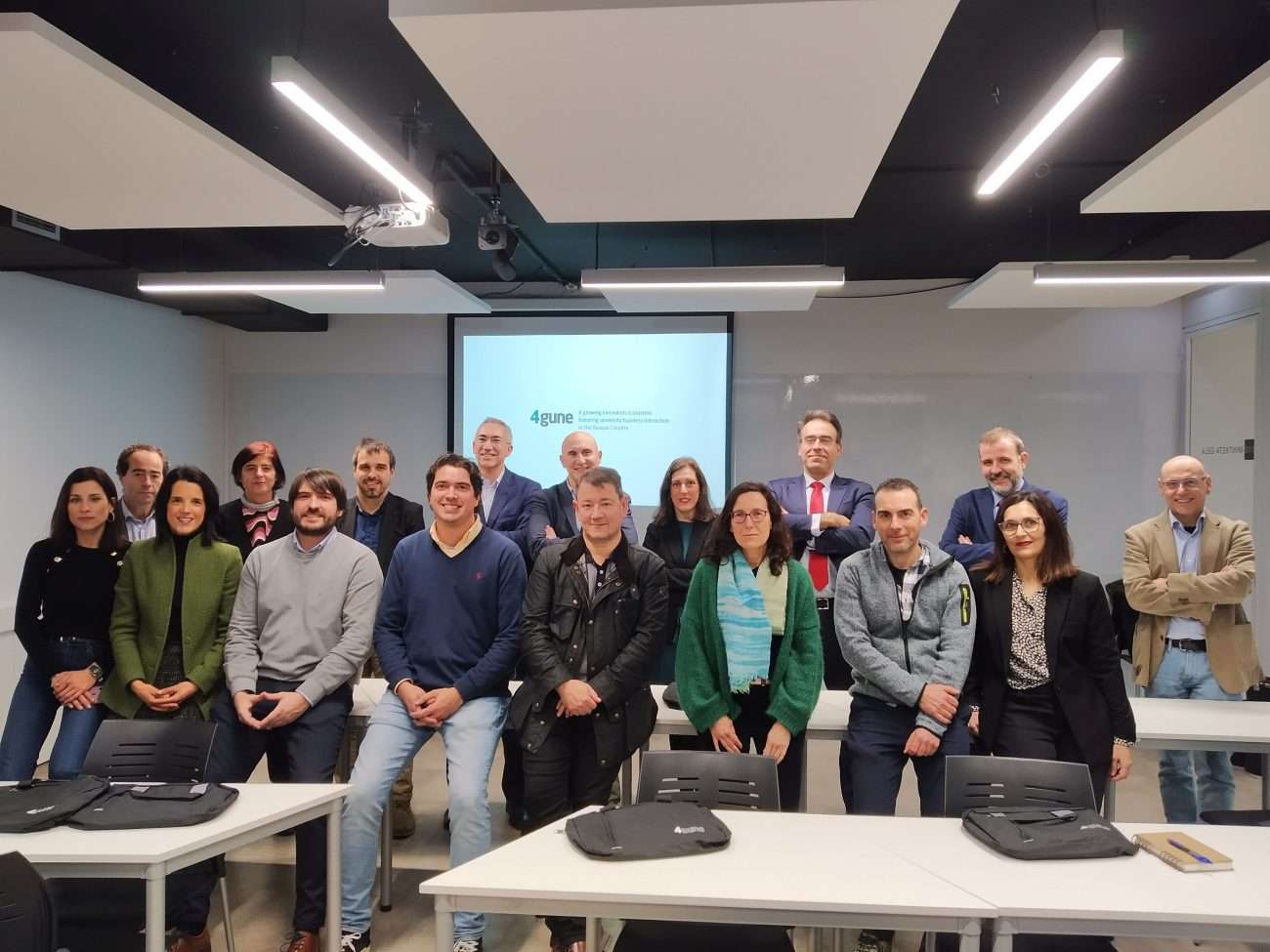The first edition of the Smart Industry Executive Programme has been successfully completed in 2023, coordinated by 4gune - Basque Engineering, Science and Technology Cluster, with the support of the Basque Government’s Deputy Ministry for Universities and Research and the academic committee, which is made up of the IMH Advanced Manufacturing Campus, the Faculty of Engineering at Deusto University, Goi Eskola Politeknikoa - Mondragon University and Tecnun- Navarra University.
The Smart Industry Executive Programme has been a pioneering experience that has offered a coordinated response from the Universities in the Basque University System to the business demand for on-going training. The training programme aimed to offer practical and dynamic training and qualifications to management profiles (CEO, senior management, etc.) of Basque companies, providing them with the knowledge, orientation and tools to lead the transition towards Smart Industry in their organisations.
Naiara Vidal Lecue, lecturer on the IMH Advanced Manufacturing Campus and coordinator of the Executive Programme’s academic committee, reports on the results of the first edition of this tailor-made training.
4gune: The Smart Industry Executive Programme has been an innovative experience of inter-university and public-private collaboration. What would you say are its most outstanding elements?
Naiara Vidal: One of the most outstanding features is the collaboration between different universities in the Basque University System. The active and coordinated participation of various academic institutions offers the training a comprehensive and diversified perspective. The support of entities, such as the Basque Government’s Deputy Ministry for Universities and Research and Euskampus Fundazioa, and the business demand for continuous training have been key in the design and development of the programme.
The programme has offered a combination of sessions with expert speakers covering technology and organisational matters. These sessions have fostered debate and the atmosphere created between teachers and participants, people with extensive experience and responsibility in their companies, has been a key feature of the programme. The training included visits to companies and the opportunity to work on a final project integrating the concepts learned. In this respect, the projects have focused on performing a digital diagnosis of their companies and proposing roadmaps for the digitalisation of specific areas of their organisations. This is an outstanding element because it contributes to taking steps in the digital transformation of the industrial sector.
4gune: What are the impressions of the IMH Advanced Manufacturing Campus in coordinating this training programme?
Naiara Vidal: The impressions of the IMH Advanced Manufacturing Campus in coordinating this training programme have been extremely positive. It is a pioneering collaboration between universities which have succeeded in working together effectively. The process has been smooth and successful, with significant collaboration by all the people involved. I would highlight the good working environment created despite the fact that it was largely carried out online, as the programme was designed in the midst of the pandemic.
There have been numerous venues for the sessions, distributed across different campuses, which has enriched the training experience, but involved an additional challenge in terms of organisation and coordination. The involvement of a large number of lecturers has been significant, which has been challenging, but at the same time, it has given us the opportunity to learn together and understand each other better in this collaborative process.
4gune: How does the academic committee assess the overall result of the first edition of the Programme in response to the demands of the sector?
Naiara Vidal: The academic committee has an extremely positive opinion of the result of the first edition of the Smart Industry Executive Programme. Throughout the design, implementation and evaluation process, we have focused on fulfilling the needs and expectations of the business environment.
We have also received valuable feedback from the people involved, which is very enriching when it comes to making specific improvements to future training programmes so that they remain effective and in line with the changing demands of industry.
This encourages us to continue working closely within the 4gune cluster and with the business sector to continue to provide quality training that contributes significantly to the transformation towards Smart Industry in the region.
4gune: What were the elements most highly valued by the students which made this training stand out?
Naiara Vidal: The students highlighted several elements. First of all, the high level of the speakers, who provided solid and current knowledge on Smart Industry. The close relationship between participants and teachers has also been key. The participative approach and the availability of the teaching staff to answer queries and enter into debate have fostered a collaborative and enriching learning environment.
Networking has been another highlight. The opportunity to establish contacts with professionals from different profiles and backgrounds has broadened horizons and fostered potential future collaborations.
Inter-university collaboration has also been highly valued, enabling a diverse range of academic approaches and enriching perspectives. Finally, the visits to the BDIH nodes have provided a practical and specific vision of the implementation of technologies and strategies in Smart Industry, consolidating theory with industrial reality.
These combined elements have enhanced the value of this training for the participants.
4gune: How do you expect this inter-university training programme to evolve?
Naiara Vidal: We hope this programme will evolve in a dynamic and adaptive way. Our vision focuses on continuing to work together closely, strengthening collaboration between universities and establishing strong ties with the business sector. We seek to adapt our offer to the new realities of the industrial environment, incorporating emerging subjects and the latest technology that is transforming Smart Industry.
Given the changing and accelerated nature of the business and technological environment, training programmes focused on the training and qualification of high-level profiles must change and evolve at the same pace. We are therefore committed to keeping abreast of market trends and needs, ensuring that our programmes are up-to-date and relevant to train the Smart Industry professionals of the future. The teaching methodologies and formats must also match the demands and needs of people today, so new courses in 2024 will follow these lines.
----------
Further information
The information on the upcoming 4gune inter-university programmes in the field of smart industry, will be shortly available on the Training section.
News related news
-

4gune, a new Regional Skills Partnership in Europe
4GuneThe European Commission has included 4gune as one of the initiatives recognised as part of the 4th anniversary of the European Skills Pact. 4gune, a Basque cluster based around university education on engineering, science and technology, and its ecosystem, will contribute towards developing the talent and competitiveness of the Basque Country up to 2030.
-

4gune partners with the global competition “Universities for Goal 13”
4GuneStudents from SDSN member institutions in the Basque Country, UPV/EHU and Deusto University, are invited to participate in the UN global competition to address the energy transition. In this edition, 4gune will support both institutions during the application and selection process.
-

Asier Albizu: "We need a new model of collaboration that responds to sectoral needs, based on interdisciplinarity and highly qualified talent."
4GuneBIOLAN, which has recently won the National Innovation Award 2024, is one of the companies participating in the first edition of the 4gune + PARKE Programme. In this interview, Asier Albizu, CEO at BIOLAN presents his organisation, as well as his vision of Business + University cooperation for the development of solutions, knowledge transfer and talent attraction.
